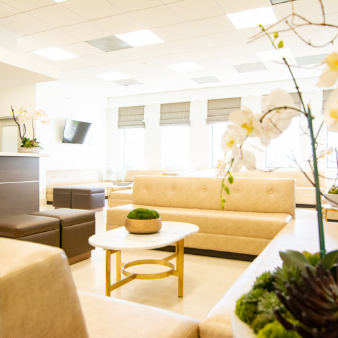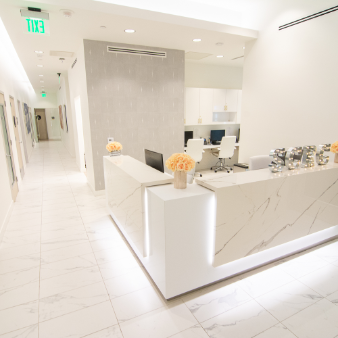If you’ve recently been diagnosed with breast cancer, you may understandably be feeling worry, anger, sadness, or you might just be feeling numb—especially if you plan on having children in the future. If you’re planning on starting or growing your family, it’s important to understand what you can do before treatment to improve your future fertility options.
If you’re dealing with a new breast cancer diagnosis, we offer a range of services, support, and assistance to help you explore your options for having a baby after cancer.
About 9% of all new cases of breast cancer in the United States are found in women 45 years old and younger[1]—aka women of optimal childbearing age.
Swedish researchers found that 23% of women who underwent fertility preservation before treatment conceived after treatment in comparison with 9% of the women who did not undergo fertility preservation.[2] The researchers are quick to caution against comparing the two groups directly, however, because they could not control for all variables, such as the mother’s health or how motivated the women were to conceive in either case.
There are a number of fertility options available to you after you’re diagnosed with breast cancer to improve your chances of conception.
Thinking Ahead Keeps Your Options Open
The best time to think about preserving fertility is before treatment. Chemotherapy can affect your ovarian reserve and decrease fertility potential. Additionally, some patients with breast cancer, will be advised to remove their ovaries in the future.
Cryopreservation is the practice of freezing your embryos or eggs for future use. When this is done before treatment, you have the greatest number of options after treatment. It is also sometimes possible to achieve in the period between a mastectomy and starting chemotherapy. Given the need to oftentimes move quickly from an unexpected diagnosis to treatment, your fertility team will coordinate with your medical team to see if an egg retrieval process is possible prior to treatment. This is highly personalized on a case-by-case basis.
Hormone injections are typically required. Your fertility specialists will discuss whether hormone injections are safe for your particular type of cancer. Often, for hormonally sensitive cancers, your fertility specialist will add a medication called letrozole to reduce the estrogen exposure in your body.
After treatment and clearance by your medical team, if conception hasn’t occurred—or cannot occur—spontaneously, the frozen embryo is thawed and placed in your uterus with the intention of creating a pregnancy. If you choose to have your eggs harvested but not fertilized, the eggs can be thawed, fertilized with your partner’s sperm or donor sperm, and implanted in your uterus.
Options After Treatment
If you were fertile before you were diagnosed with breast cancer, you may be able to conceive naturally after treatment. Doctors may recommend you wait 6 months to 2 years before conceiving to reduce the risk of birth defects from chemotherapy and to make sure the cancer hasn’t come back.
However, in most cases treatment includes radiation or chemotherapy that affects your pelvic area and diminishes the ovarian reserve such that you are unable to conceive spontaneously. This is where having done an egg or embryo freeze prior to treatment is useful. When you are ready to get pregnant, you can thaw your frozen eggs or embryos to achieve pregnancy.
Women who get pregnant after breast cancer treatment have no greater risk for congenital abnormalities in the child than women who have not had breast cancer.[3] On another positive note, these women have not been shown to have any adverse effects on their long-term survival compared with those who did not get pregnant.[4]
Conceiving After Treatment if You Did Not Freeze Eggs or Embryos
Sometimes although your ovarian reserve may be diminished after treatment, it is still possible to conceive using in-vitro fertilization. However, when this is not possible, if you have a healthy uterus, you still may be able to conceive and carry a child to term using donor eggs or embryos.
Donor eggs can be from someone you know, someone you don’t know, or through an egg bank. They can be free, or there may be a cost associated with them. If you know the donor, it is important to settle on the donor’s relationship with the child before beginning any procedure.
Your fertility specialist will fertilize the donor eggs with sperm from your partner or a donor in a procedure called in vitro fertilization (IVF). A resulting embryo is implanted in your uterus to create a pregnancy.
In the case of an embryo, the egg has already been fertilized before being frozen, and after thawing, is implanted in your uterus. Donor embryos are typically created by an egg and sperm from unrelated people.
The option of using a gestational carrier is also available for women in whom pregnancy is not deemed safe.
Getting the Support You Need
If you are diagnosed with breast cancer and would like to start a family one day, the key to the very best outcome is to include a fertility specialist in your medical team. Fertility specialists keep up with the latest treatments and work with your oncologist to help you determine the very best course of action for you.
Breast cancer on its own can cause a multitude of psychological impacts. You may experience anxiety, grief, fear, and depression. Beyond tending to the medical aspects of breast cancer, it is equally important to tend to the psychological and emotional side. This applies not only to the woman with breast cancer but also to partners and caregivers.
As you are considering your breast cancer team, make sure that you add a mental health specialist to your team. It’s important to work with a multidisciplinary team including oncologists, fertility specialists, nurse counselors, and mental health professionals to receive the highest quality care.[5]
Addressing all aspects of yourself before, during, and after breast cancer treatment gives you the very best chance of recovery, and of creating the family you want following treatment. It can also go a long way toward offsetting the more overwhelming challenges of breast cancer, treatment, and conception.
If you’re exploring your fertility options following a breast cancer diagnosis, treatment, or recovery, schedule a consultation with Southern California Reproductive Center. Our team of physicians specializes in helping patients with a wide range of fertility obstacles navigate those challenges to pursue their path to parenthood.
[1] CDC, Breast Cancer In Young Women, September 2021
[2] National Cancer Institute, Fertility Preservation Safe for Young Women with Breast Cancer, December 2020
[3] Breastcancer.org, Pregnancy Is Safe After a Breast Cancer Diagnosis, Study Shows, December 2020
[4] American Association for Cancer Research, Breast cancer survivors are less likely to get pregnant, but often have healthy babies and good long-term health, December 2020
[5] Obstet Gynecol Sci, Knowledge and awareness about fertility preservation among female patients with cancer: a cross-sectional study, 2020




